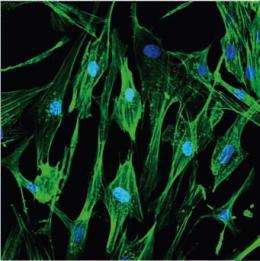Detecting molecules on skin

NPL is developing a state-of-the-art technique called 'ambient surface mass spectrometry' that can quickly detect small molecules on the surface of the skin and could benefit the $250 billion a year personal care product industry.
The detection of small molecules on skin could help develop new health and personal care products such as moisturisers, deodorants and antibacterial gels, by generating a greater understanding of how these products are absorbed into the skin.
Mass spectrometry is a powerful analytical technique with high chemical specificity and sensitivity, meaning that it can detect specific molecules in very low amounts. Ambient mass spectrometry enables this analysis on surfaces at atmospheric pressure.
During the research, adult human dermal fibroblast cells were cultured on glass microscope slides to provide a layer of cells that represented the skin. A selection of anti-ageing creams were then deposited on the cells and analysed using two different ionisation techniques: DESI (Desorption Electrospray Ionisation) and PADI (Plasma Assisted Desorption Ionisation).
Fourteen key ingredients were analyzed and identified from the samples including sunscreen agents, solvents and aromas, as well as siloxanes ‑ a common ingredient found in most personal care products.
The speed and detail with which ambient mass spectrometry analyses these samples will help new products progress through the research and development stage, reducing the time it takes for them to appear on the pharmacy or supermarket shelves.
Provided by NPL



















